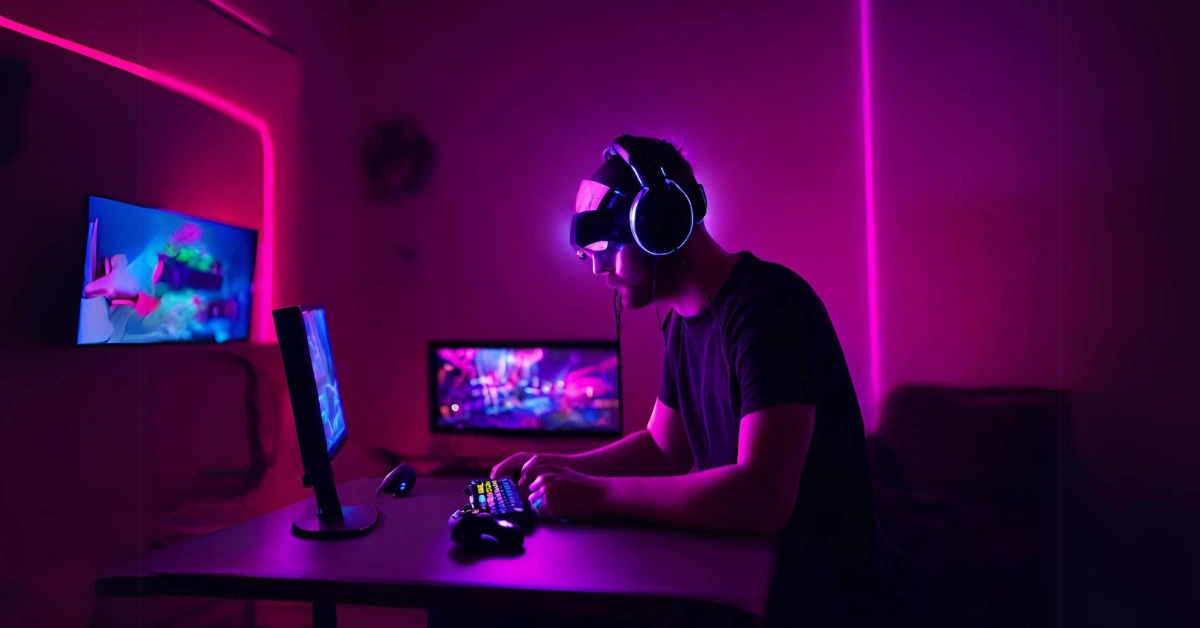Leveling Up Your Sanity: How Gaming is the Holiday Stress-Relie…

Welcome to the digital age, where video games are not just child’s play; they’ve evolved into a cultural phenomenon. But, while you’re leveling up in virtual realms, have you ever paused to ponder the effect of your epic gaming marathons on your precious noggin?
Some researchers, like those at Oxford University, suggest games can be good for our well-being. Yet, there’s a flip side: the ever-ominous shadow of addiction and potential mental health hiccups.
The Positive Aspects of Gaming for Mental Health
Before you endure another eye-roll from Aunt Karen lamenting about “those darn video games,” arm yourself with some glorious game-friendly facts. Video games aren’t just joystick-thrilling adventures; they’ve got a glitzy side filled with mental bonuses.
Brain Gym, Anyone?
Video games aren’t all about button mashing; they’re sneaky boot camps for the brain. A study from the University of York found that certain video games can actually enhance our problem-solving skills and critical thinking prowess.
And remember those intricate game plots? They’re not just enthralling; they’re doing wonders for your memory and attention span. Think of it as your brain doing mental push-ups!
Nope, Not Just a Feels Trip
Seeking an escape from that pesky Monday blues or the never-ending pile of laundry? Video games can be your magic portal. Beyond just escapism, they gift players with a rewarding sense of achievement — and who doesn’t love that dopamine rush?
Plus, for those who see life as a canvas, games are the perfect platform for self-expression and creativity. A study from the American Psychological Association mentions how games play a pivotal role in emotional growth.
It’s a Party in the Virtual World!
Forget the stereotype of the lone gamer holed up in a dimly lit room. The gaming universe is buzzing!
Multiplayer games and online platforms are transforming solitary quests into epic team adventures. They encourage collaboration, teamwork, and — here’s the kicker — general social interaction. A report from Pew Research highlights that 57% of teens have made new friends online through video games.
More Than Just Playtime
The world is waking up to the therapeutic magic og video games. No longer just recreational tools, these pixelated wonders are entering the realm of therapy.
Games specifically designed for therapeutic interventions are emerging like stars. For example, researchers at the University of California found that certain games can assist with anxiety management and even alleviate symptoms of depression.
The Potential Risks and Concerns
We’ve lavished praise on our pixel-powered passions, but we’d be fooling ourselves if we didn’t address the boss-level concerns lurking in the gaming universe. Just as every game has its villains, our beloved digital realm has its pitfalls. And trust me, it’s not all fun and joystick.
When “One More Game” Becomes the Mantra
There’s a thin line between passion and obsession. The World Health Organization officially recognized “gaming disorder” as a legitimate concern, pointing to behaviors dominated by gaming and significant life impairments.
The symptoms? They range from sacrificing sleep to compromising real-life responsibilities. Remember: Playing to level up is fab; letting the game level you down? Not so much.
Who Needs a Gym When You’ve Got a Gaming Chair, Right? Wrong.
We’ve all been there — frozen in a marathon gaming session, only to realize our bodies feel more “zombie” than “hero.” Extended gaming can tag along with unwanted buddies like weight gain, eye strain, and posture woes.
Harvard Health mentions that sedentary behavior can come with health risks like cardiovascular disease. And don’t get me started on the notorious “gamer’s thumb.”
Game Over to Peace of Mind?
Some darker genres of games can leave you with more than just a racing heartbeat. There’s chatter about increased aggression or becoming numb to violent scenarios. And while the digital world can be vast and connecting, it’s essential not to drift from the real-life barrier.
A study by Addict Health suggests excessive gaming can potentially hamper social skills. So, it’s worth keeping an eye on how much virtual drama you’re loading onto your emotional hard drive.
Balancing Gaming with a Healthy Lifestyle
There’s no denying the allure of the gaming universe — where else can you fend off alien invasions, master martial arts, or manage your own virtual empire, all in your pajamas? But just like a perfectly timed power-up, it’s all about balance.
Because No, 3 A.M. is NOT Prime Dragon-Slaying Time (all the time)
Look, we get it. The siren song of the “next level” can be irresistibly catchy. But remember: even the mightiest of avatars need some downtime.
Designate gaming hours, keeping in mind that the Stanford Center on Longevity highlighted the importance of consistent sleep patterns for cognitive function. Regular breaks? They’re not just for the week. They’re a secret weapon to recharge both your controller and your brain.
Your Avatar’s Abs Aren’t the Only Ones Worth Flexing
Couch-potato gaming is so last decade. Insert a mini-workout session or a stretch-a-thon between those gaming marathons. After all, research from Mayo Clinic advocates for regular physical activity to boost mood and reduce health risks.
And for the love of all things pixelated, don’t neglect that gaming throne of yours. Ergonomic chairs and desks can be game-changers, quite literally, keeping those pesky backaches at bay.
Virtual Parties are Lit, But Don’t Ghost Your IRL Squad
Yes, your guild might be your second family, but there’s a world outside the headset waiting to be explored. The Quality of Life Research underscores the benefits of face-to-face interactions for mental well-being.
Organize a board game night, hit up local gaming events, or simply catch up over coffee. The IRL XP points are worth it!
The gaming realm — a mix of brain-boosting elixirs and cautionary tales. Balance is the ultimate cheat code. Play hard, level up, but remember to respawn in reality.
Like this project
Posted Oct 21, 2023
Welcome to the digital age, where video games are not just child’s play; they’ve evolved into a cultural phenomenon. But, while you’re leveling up in virtual r…








